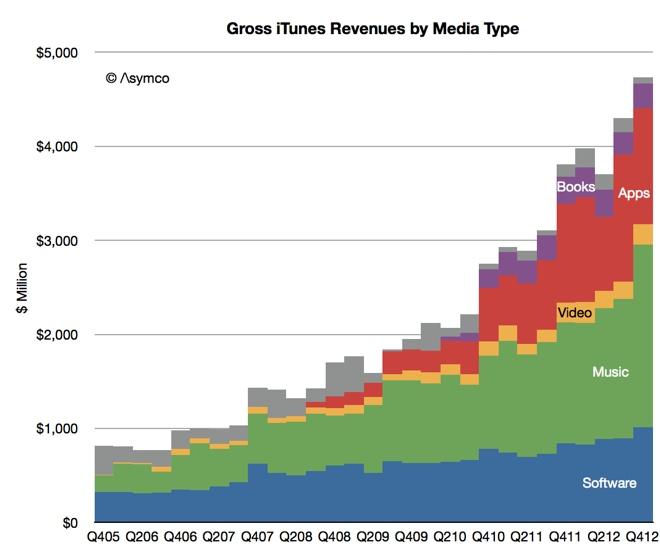Once a break-even business used to drive sales of Apple's high-margin hardware, the iTunes Store is now estimated to be raking in more than $2 billion per year, due largely to the inclusion of its in-house software development teams.
Apple's iTunes revenue over the years. Chart by Asymco.
Ahead of the 10th anniversary of the iTunes Store in April, Horace Dediu of Asymco offered an analysis on Friday highlighting how successful the digital storefront has become. Apple's iTunes business has evolved over the years, beginning with music, and eventually adding movies, TV shows, applications, books and more.
Dediu calculates that the break-even cost for the iTunes Store would be $3.75 billion, but he believes it's "hard to imagine this level of operational expenses for digital content."
His calculations suggest the App Store earns about 2 percent margins on software, while the iTunes Music Store likely earns Apple about 1 percent margins, leading to only $150 million.
But a key factor is Apple's Software group, which is now a part of the company's iTunes division. Dediu referred to Apple's software team as "one of the forgotten heroes of Apple."
With products like OS X upgrades, the consumer-oriented iWork and iLife suites, and professional-grade software like Final Cut Pro and Aperture, his analysis concludes that Apple's own software earned $3.6 billion last year. His figures are based on a presumed operating margin of around 50 percent, which would be comparable to software giant Microsoft.
In the holiday quarter, Apple's iTunes business saw sales grow 25 percent year over year to $1.8 billion. Apple also continues to expand the iTunes Store globally, nearly doubling it to 119 countries by adding 56 new nations in that one three-month span.
The iTunes Store also reached a milestone in early February, when the 25 billionth song was sold, and the pace of downloads has steadily increased year over year.
Within just the App Store side of the iTunes business, Apple has announced that it has paid $7 billion to developers. Apple takes a 30 percent cut of all iOS software sales, which means it has earned $3 billion from the App Store since its debut in 2008.
 AppleInsider Staff
AppleInsider Staff







-m.jpg)






 Brian Patterson
Brian Patterson
 Charles Martin
Charles Martin


 Malcolm Owen
Malcolm Owen
 William Gallagher
William Gallagher
 Christine McKee
Christine McKee
 Marko Zivkovic
Marko Zivkovic









18 Comments
Didn't Apple already say they break even on iTunes stuff? His guesses must be somewhat wrong in that regard.
Didn't Apple already say they break even on iTunes stuff? His guesses must be somewhat wrong in that regard.
I'm sure they did say that a few years ago.
Things do change, you know.
[quote name="GQB" url="/t/156612/itunes-estimated-to-rake-in-in-2b-per-year-thanks-to-apples-software-division#post_2298866"]I'm sure they did say that a few years ago. Things do change, you know. [/quote] I think it's been more than a few years since I last heard that. Since then we've not only seen the iTS grow at an incredible rate, but many other services added, including the app stores. I think it's highly likely they are making more profit from the iTS than most of their competitors make from all their products combined.
Fascinating curve, which can be observed in other Apple products lines : each item is growing + new items are added over time, which result in a very dynamic growth ratio
Yeah they said it was just above break-even about 3 years ago: http://news.cnet.com/8301-13579_3-20071022-37/report-itunes-costs-apple-$1.3-billion-a-year-to-run/ http://news.cnet.com/8301-13579_3-20008540-37.html http://allthingsd.com/20100225/apple-billions-of-songs-billions-of-apps-not-much-profit/ To service 500 million users, they must have at least 50,000-100,000 servers. Even between staff, the centre costs and the servers, it doesn't seem like it would cost over $3b but without knowing all the costs involved, it's hard to say. They might purposely run it close to break-even to be competitive.